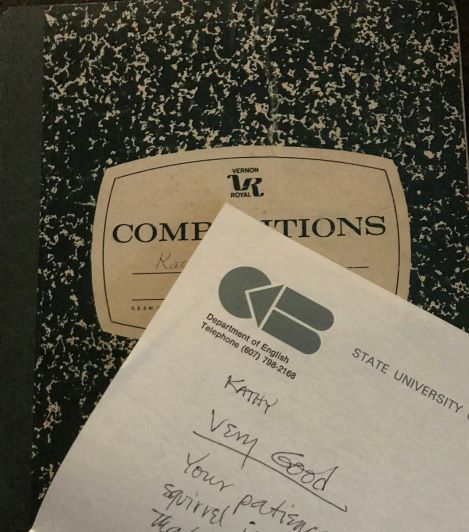The college professor listed the grading criteria for the creative writing class. He spent much of the time describing his expectations of a writer’s journal we were to keep for the entire semester. We had to purchase a composition notebook and number each page, except for the first page, which was to be an index for our entries. The assignment was to record our observations on a daily basis.
The black-and-white marbled notebook became my frequent companion. Entries described places I visited in upstate New York and things I experienced during that autumn semester of my second year of college. Each entry was written in longhand, dated, and the page number recorded in the index on the first page based on the sense(s) the entry demonstrated.
Mid-way through the course, the professor collected the journals for grading purposes. The following week he reported his disappointment with many of the journals. He said he would read examples from a few of the journals that illustrated what he expected of a writer’s journal. He opened a composition notebook and began reading.
I recognized the words immediately. They were my words—my descriptions of a squirrel and autumn leaves. He read several more entries. I lowered my eyes, embarrassed that my writing was being shared with the class. Yet, my lips curved into a smile because the instructor liked my writing.
When he returned the journals, I found a folded one-page note from the instructor inside the front cover. It read:
Very good. Your patience and interest in the squirrel is a pleasure to read and that’s just the beginning. There’s a lot of energy here, Kathy, page after page… I’ll read some to the class.
From that creative writing class, I learned the writer’s journal is a powerful tool. A writer needs to sharpen his/her observation skills. Recording sensory specifics in a journal builds an inventory of experiences for future use. Adding details to written prose or poetry pulls the reader into the story and strengthens the integrity of the written piece. That’s the benefit of keeping a writer’s journal.

Wonderful story…thanks for sharing!
So glad you enjoyed the story, Jim.
What a glorious idea for writers. I’ve been told keep a journal, but never had it explained in this way. Great idea for all writers. Thanks for sharing.
Keeping a writer’s journal helps fine-tune the writer’s observation skills. It calls for sensory details and attention to details. The process of capturing the details of a person, place, thing or incident in writing makes it more vivid in your mind. The details can be used in subsequent creative writing endeavors.